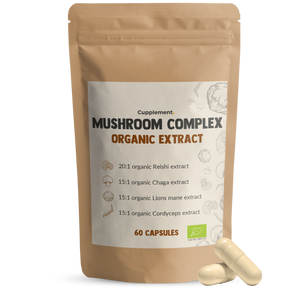
What is Metabolism and how do you accelerate it?
What is Metabolism?
What is metabolism and how do you speed it up? Your metabolism is another word for metabolism. Metabolism is the way and rate at which your body converts calories, which come in through food and liquids, into energy. Some people have a slow metabolism, which means you burn less energy than a person with a fast metabolism. An example of this is when a young man has a growth spurt at 15, he can eat a lot without storing a lot of fat. This is because it takes a lot of energy for the body to grow and maintain all bodily functions optimally. An older person who loses muscle and bone mass lose weight and is less active, has a slower metabolism. The elderly therefore often eat less, because they also have less appetite due to a slowed metabolism.
Metabolism and weight loss
Your metabolism also plays an important role in gaining weight and losing weight. Your metabolism determines how many calories you consume per day. When you consistently take in more calories than you burn, you gain weight, and when you consistently take in fewer calories than you burn, you lose weight. body weight.
If you want to lose weight, it is therefore beneficial to have a faster metabolism. This ensures that you don't have to follow extreme diets to lose some weight! If you have a low metabolism (often caused by inactivity, a bad diet or a medical condition), it is more difficult to lose weight because you can eat less than someone with a normal/high metabolism to lose the same amount of weight.
How do you speed up your metabolism?
It is possible to increase your metabolism, but how do you do that? The most important examples of this are; building muscle, eating enough food, eating protein, eating as little processed products as possible and getting enough sleep. Not only does this increase your metabolism, but it also promotes a healthy lifestyle.
Metabolism and Muscles
In order to live, your body needs energy (your resting metabolism). All the functions your body has cost energy. This includes maintaining muscle, building and maintaining muscle mass. These things cost your body energy, for this reason weight training is a nice way to speed up your metabolism. Because the more muscle mass you have, the more energy your body needs to maintain it. So you not only burn calories while training, but you burn more in the first place calories during the day, even when you sleep!
Metabolism and nutrition
Nutrition is very important in speeding up your metabolism. A common mistake among people who want to lose weight is that they follow a strict diet, whereby the body receives a very limited amount of energy. What then happens is that your body starts saving energy because it realizes that it is not getting enough to function optimally. As a result, for example, your muscle mass can decrease, because it takes too much energy for your body to maintain everything. It has been explained above why it is good to retain more muscle mass. Eating too little can therefore have the opposite effect.
What can also help speed up your metabolism is a diet with a high amount of protein. This does not mean abnormal amounts, but about 1 to 2 grams per kg of body weight, depending on your daily exercise. Proteins have a high thermal effect, this means that it takes your body a lot of energy to absorb and to process proteins in your body. As much as 10 times more than carbohydrates and fats. This also speeds up your metabolism.
Metabolism and Sleep
Sleep is also very important. Little sleep affects your health in several ways. When looking at metabolism, lack of sleep can get in the way of your nutrition and training efforts, which have been described above as being very important. Not only can you gain fat mass from reduced sleep in itself and ensure that your muscle building slows down, but it also has a negative influence on the production of leptin, which can cause a increased appetite. In short, get enough sleep!
What is metabolism and how do you speed it up?
The solution to this question therefore mainly lies within your lifestyle. There are many other ways to speed up the metabolism such as coffee! Read here and here about even more factors that affect your metabolism!
Popular products
-
Cupplement Frother

Handy frother for mixing additives to your coffee.
Order now -
Lions Mane

Lions Mane is known to help improve your concentration.*
Order now -
Matcha

Energy
Immunity
Matcha is een fijngemalen groene thee poeder dat traditioneel wordt gebruikt in de Japanse theeceremonie.
Order now -
Pill box

Introducing our sleek and convenient Pill Organizer – the perfect solution to streamline your supplement routine!
Order now -
Mushroom complex capsules

Discover the ultimate support for your overall well-being with our Organic Mushroom Complex in convenient capsules! Now with more active ingredients.
Order now -
Gourd set with bombilla

Handy frother for mixing additives into your coffee.
Order now



















